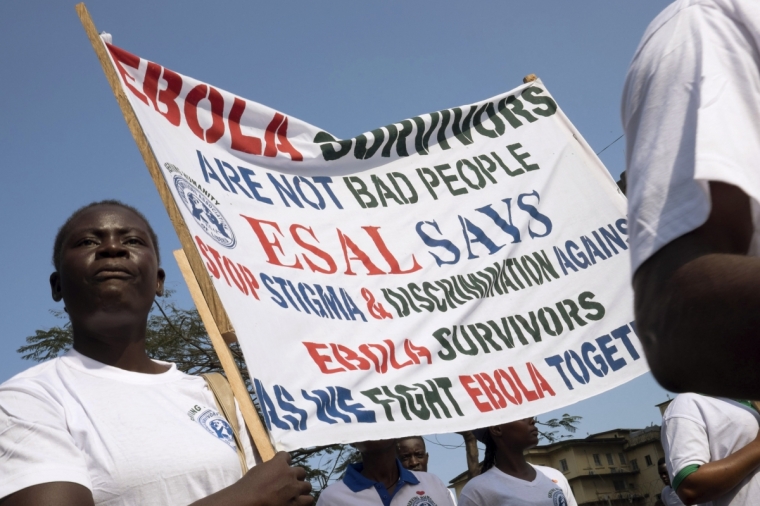Ebola Virus Passed on to Female Through Sex with Survivor Despite Five Months Passing Since Infection

Ebola survivors can still spread the virus through unprotected sex even five months after being diagnosed and subsequently cured of the deadly disease, health experts revealed.
The finding was made after a woman who likely caught the virus through sex with an Ebola survivor died recently.
Health experts earlier pronounced that the Ebola virus could remain in semen for about three months from the time of infection. But the latest case in West Africa shows that transmission of the virus through sex can occur even five months later.
According to the Morbidity and Mortality Weekly Report of the Centers for Disease Control and Prevention released on Friday, a 44-year-old woman from Liberian capital Monrovia developed headache, weakness, joint pain and nausea on March 14 after having unprotected vaginal sex with a 46-year-old male Ebola survivor on March 7.
The survivor was released from an Ebola treatment unit on Oct. 7 last year and reported no illness or symptoms afterward. He was admitted to the unit the month before.
Another woman, age 45, who had unprotected vaginal sex with the same survivor tested negative for the virus.
Based on the case, health officials are now urging male Ebola survivors to avoid unprotected sex for an indefinite period of time. Previously, male survivors were asked to use condoms for at least three months.
"Previously, C.D.C. and W.H.O. recommended abstinence or condom use for at least three months following recovery from Ebola. However, to prevent transmission of Ebola, contact with semen from male survivors should be avoided," the C.D.C. said in its latest statement.
"If male survivors have sex (oral, vaginal, or anal), a condom should be used correctly and consistently every time until further information is known. Used condoms should be handled and disposed of safely to avoid contact with semen. After handling of condoms, or following any physical contact with semen, skin should be washed thoroughly with soap and water," it added.
The virus is passed on from one person to another through direct contact with the patient's blood or other bodily fluids such as urine, saliva, semen, and sweat.
Surviving patients are not contagious, but there is a chance that there is still some virus remaining in their semen, health experts said.
An investigation on other recent Ebola cases in Liberia, Guinea and Sierra Leone also showed sexual transmission of the deadly virus from survivors, but these reports have yet to be confirmed.
Only 10 cases of this nature have been reported so far, and it has been hard to prove that sex was the only way the virus was passed on, said C.D.C. spokeswoman Kristen Nordlund.
 Christians don't have to affirm transgenderism, but they can’t express that view at work: tribunal
Christians don't have to affirm transgenderism, but they can’t express that view at work: tribunal Archaeology discovery: Medieval Christian prayer beads found on Holy Island
Archaeology discovery: Medieval Christian prayer beads found on Holy Island Presbyterian Church in America votes to leave National Association of Evangelicals
Presbyterian Church in America votes to leave National Association of Evangelicals Over 50 killed in 'vile and satanic' attack at Nigerian church on Pentecost Sunday
Over 50 killed in 'vile and satanic' attack at Nigerian church on Pentecost Sunday Ukrainian Orthodox Church severs ties with Moscow over Patriarch Kirill's support for Putin's war
Ukrainian Orthodox Church severs ties with Moscow over Patriarch Kirill's support for Putin's war Islamic State kills 20 Nigerian Christians as revenge for US airstrike
Islamic State kills 20 Nigerian Christians as revenge for US airstrike Man who served 33 years in prison for murder leads inmates to Christ
Man who served 33 years in prison for murder leads inmates to Christ


 Nigerian student beaten to death, body burned over ‘blasphemous’ WhatsApp message
Nigerian student beaten to death, body burned over ‘blasphemous’ WhatsApp message 'A new low': World reacts after Hong Kong arrests 90-year-old Cardinal Joseph Zen
'A new low': World reacts after Hong Kong arrests 90-year-old Cardinal Joseph Zen Iran sentences Christian man to 10 years in prison for hosting house church worship gathering
Iran sentences Christian man to 10 years in prison for hosting house church worship gathering French Guyana: Pastor shot dead, church set on fire after meeting delegation of Evangelicals
French Guyana: Pastor shot dead, church set on fire after meeting delegation of Evangelicals ‘Talking Jesus’ report finds only 6% of UK adults identify as practicing Christians
‘Talking Jesus’ report finds only 6% of UK adults identify as practicing Christians Mission Eurasia ministry center blown up in Ukraine, hundreds of Bibles destroyed: 'God will provide'
Mission Eurasia ministry center blown up in Ukraine, hundreds of Bibles destroyed: 'God will provide' Church holds service for first time after ISIS desecrated it 8 years ago
Church holds service for first time after ISIS desecrated it 8 years ago Burger King apologizes for 'offensive campaign' using Jesus' words at the Last Supper
Burger King apologizes for 'offensive campaign' using Jesus' words at the Last Supper Uganda: Muslims abduct teacher, burn him inside mosque for praying in Christ’s name
Uganda: Muslims abduct teacher, burn him inside mosque for praying in Christ’s name